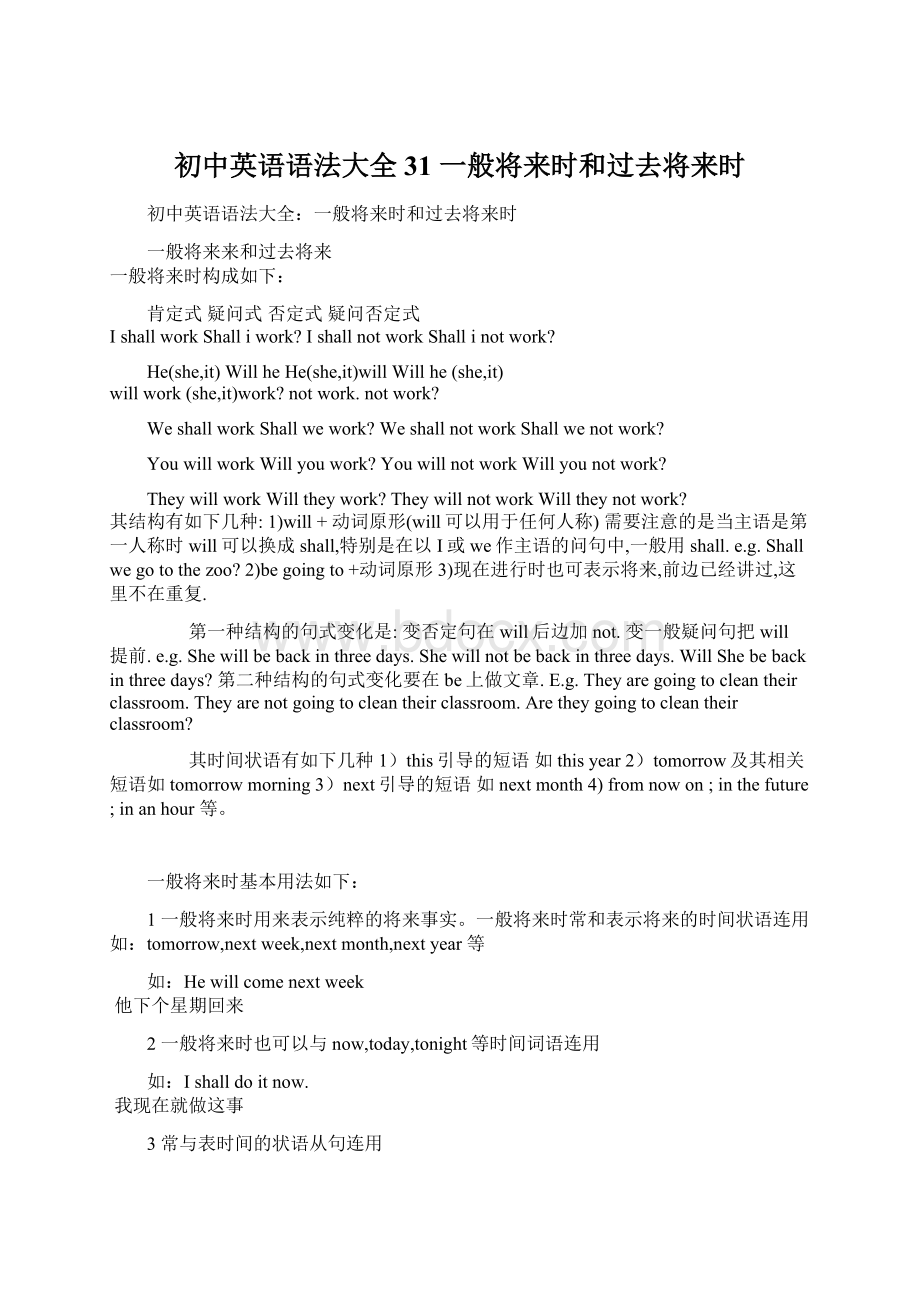初中英语语法大全31 一般将来时和过去将来时.docx
《初中英语语法大全31 一般将来时和过去将来时.docx》由会员分享,可在线阅读,更多相关《初中英语语法大全31 一般将来时和过去将来时.docx(7页珍藏版)》请在冰豆网上搜索。

初中英语语法大全31一般将来时和过去将来时
初中英语语法大全:
一般将来时和过去将来时
一般将来来和过去将来
一般将来时构成如下:
肯定式疑问式否定式疑问否定式
IshallworkShalliwork?
IshallnotworkShallinotwork?
He(she,it)WillheHe(she,it)willWillhe(she,it)
willwork(she,it)work?
notwork.notwork?
WeshallworkShallwework?
WeshallnotworkShallwenotwork?
YouwillworkWillyouwork?
YouwillnotworkWillyounotwork?
TheywillworkWilltheywork?
TheywillnotworkWilltheynotwork?
其结构有如下几种:
1)will+动词原形(will可以用于任何人称)需要注意的是当主语是第一人称时will可以换成shall,特别是在以I或we作主语的问句中,一般用shall.e.g.Shallwegotothezoo?
2)begoingto+动词原形3)现在进行时也可表示将来,前边已经讲过,这里不在重复.
第一种结构的句式变化是:
变否定句在will后边加not.变一般疑问句把will提前.e.g.Shewillbebackinthreedays.Shewillnotbebackinthreedays.WillShebebackinthreedays?
第二种结构的句式变化要在be上做文章.E.g.Theyaregoingtocleantheirclassroom.Theyarenotgoingtocleantheirclassroom.Aretheygoingtocleantheirclassroom?
其时间状语有如下几种1)this引导的短语如thisyear2)tomorrow及其相关短语如tomorrowmorning3)next引导的短语如nextmonth4)fromnowon;inthefuture;inanhour等。
一般将来时基本用法如下:
1一般将来时用来表示纯粹的将来事实。
一般将来时常和表示将来的时间状语连用
如:
tomorrow,nextweek,nextmonth,nextyear等
如:
Hewillcomenextweek
他下个星期回来
2一般将来时也可以与now,today,tonight等时间词语连用
如:
Ishalldoitnow.
我现在就做这事
3常与表时间的状语从句连用
如:
Whenihavetime,i'llgo
我有时间就去
4与条件状语从句连用
如:
He'llhelpyouifyouaskhim
你提出请求,他就会帮助你。
5有时候条件状语从句可以省略或是暗含在上下文之中
如:
Don'tdisturbhim,he'llbeangry.
不要打扰他,他会生气的。
6用于状语从句中。
表示时间和条件的状语从句一般用一般现在时表将来。
但有时亦可用一般将来时。
连词before引导的时间状语从句可用一般将来时。
如:
Youmustfillouttheapplicationformandbeinterviewedbeforeyouwillbeconsideredforthejob.
你必须先填好申请书,经过面谈,然后才会被考虑雇佣的问题。
7用于一般疑问句,内含助动词shall的一般将来时常用在由shall或是shallwe引导的一般疑问句中。
询问对方的意图或是愿望。
回答shalli问句时候,不可以用yes,youshall或是Noyoushallnot,而是说yesplease(或是pleasedo)或是nopleasedonot(或是pleasedonot)。
回答shallwe问句时候应该说yes,let's或是noidon'tthinkweshall
如:
Shallihelpyou?
Yesplease
Nopleasedon't
Shallwecallataxi?
Yeslet's
NoIdon'tthinkweshall
一、易忽视动词用原形形式
例:
1Hewillis(be)atschoolnextMonday.
2Heisgoingtodoes(do)hishomeworkafterschool.
答案:
1be2do
解析:
第一题有的同学一看he做主语就用了is,忽视了will后应加动词原形。
我们在写句子时,很容易把动词丢掉,“英语句子里,动词不能少”的规律必须要牢记。
第二题中to后加动词原形,而不是用单三人称.。
二、begoingto+动词原形与will+动词原形用法不清楚
例:
我正努力学习,准备参加英语考试。
IamstudyinghardandIwilltryformyEnglishexams.
答案:
IamstudyinghardandIamgoingtotryformyEnglishexams.
解析:
“begoingto”表示计划、打算要做某事。
E.g.Heisgoingtovisithisfriends.还表示某种迹象表明会发生某事.e.g.Lookattheclouds.It’sgoingtorain.而“Will+动词原形”指对将来事物的预见、表示意愿、决心。
E.g.Iwillwaitforyouuntilyoucome.在单纯预测未来时,二者可以互换,但在此题中只能用begoingto,而不能用will。
将来时的一些特殊用法
1) shall用于第一人称,常被will所代替。
will在陈述句中用于各人称,在争求意见时常用于第二人称。
WhichparagraphshallIreadfirst.
Willyoubeathomeatseventhisevening?
2) begoingto+不定式,表示将来。
a.主语的意图,即将做某事。
Whatareyougoingtodotomorrow?
b.计划,安排要发生的事。
Theplayisgoingtobeproducednextmonth。
c.有迹象要发生的事
Lookatthedarkclouds,thereisgoingtobeastorm.
3) be+不定式表将来,按计划或正式安排将发生的事。
WearetodiscussthereportnextSaturday.
4) beaboutto+不定式,意为马上做某事。
HeisabouttoleaveforBeijing.
注意:
beaboutto不能与tomorrow,nextweek等表示明确将来时的时间状语连用
11.5begoingto/will
用于条件句时,begoingto 表将来
will 表意愿
Ifyouaregoingtomakeajourney,you'dbettergetreadyforitassoonaspossible.
Nowifyouwilltakeoffyourclothes,wewillfitthenewclothesonyouinfrontofthemirror.
11.6beto和begoingto
beto表示客观安排或受人指示而做某事。
begoingto表示主观的打算或计划。
Iamtoplayfootballtomorrowafternoon. (客观安排)
I'mgoingtoplayfootballtomorrowafternoon.(主观安排)
11.7一般现在时表将来
1)下列动词:
come,go,arrive,leave,start,begin,return的一般现在时表将来。
这主要用来表示在时间上已确定或安排好的事情。
Thetrainleavesatsixtomorrowmorning.
Whendoesthebusstar?
Itstarsintenminutes.
2)倒装句,表示动作正在进行,如:
Herecomesthebus.=Thebusiscoming.
Theregoesthebell.=Thebellisringing.
3)在时间或条件句中。
WhenBillcomes(不是willcome),askhimtowaitforme.
I'llwritetoyouassoonasIarrivethere.
4)在动词hope,takecarethat,makesurethat等后。
Ihopetheyhaveanicetimenextweek.
Makesurethatthewindowsareclosedbeforeyouleavetheroom.
11.8用现在进行时表示将来
意为:
"意图"、"打算"、"安排"、常用于人。
常用词为come,go,start,arrive,leave,stay等。
I'mleavingtomorrow.
Areyoustayingheretillnextweek?
自主检测:
(一)、单选
1_____you____adoctorwhenyougrowup?
AWill;goingtobeBAre;goingtobeCAre;/DWill;be
2Idon’tknowifhisuncle_____.Ithinkhe_____ifitdoesn’train.
Awillcome;comesBwillcome;willcomeCcomes;comesDcomes;willcome
3Hewillbeback_____afewminutes.
AwithBforConDin
4Whattime_____wemeetatthegatetomorrow?
AwillBshallCdoDare
5Hewillhaveaholidayassoonashe_____theworknextweek.
AfinishesBdoesn’tfinishCwillfinishDwon’tfinish
6There_____someshowersthisafternoon.
AwillbeBwillhaveCisgoingtobeDaregoingtohave
7It____mybrother’sbirthdaytomorrow.She_____aparty.
Aisgoingtobe;willhaveBwillbe;ishavingCwillbe;isgoingtohaveDwillhave;isgoingtobe
8LiMingis10yearsoldnow,nextyearhe_____11.
AisBisgoingtobeCwillbeDwilltobe
答案:
1B2B3D4B5A6A7C8C
(二)、填空
1-“Ineedsomepaper.”
-“I____(bring)someforyou.”
2____(be)youfreetomorrow?
3They_________(notleave)untilyoucomeback.
4_____we_____(go)tothepartytogetherthisafternoon?
5Theywanttoknowwhenthemeeting_____start.
6I_____(go)withyouifIhavetime.
7Hurryup!
Orwe______(be)late.
8What____you_______(do)tomorrowafternoon?
9Jenny_________(do)anexperimentthedayaftertomorrow.
10Ifsheisn’tfreetomorrow,she_______(nottake)partintheparty.
答案:
1willbring2Are3won’tleave4Shallgo5will6willgo
7willbe8aregoingtodo9willdo10won’ttake
三、Therebe结构的一般将来时易出错
例:
There_________abasketballmatchthisafternoon.(B)
AisgoingtobeBisgoingtohaveCaregoingtobeDaregoingtohave
答案:
A
解析:
Therebe结构的一般将来时既要符合Therebe结构,又要符合一般将来时。
有的同学认为have当“有”讲,所以选了B,但Therebe结构就不成立了,此句中is是begoingto中的,是由后边的单数名词决定的.
四、begoingto结构中易丢掉to
例:
I’mgoing_______(go)schoolbybiketomorrow.(C)
AtowillgoBtogotoCgotoDtogo
答案:
B
解析:
由tomorrow可知是一般将来时,begoingto+动词原形,所以先确定用togo,在B、D当中选,而gotoschool是固定词组,不能因为前边有一个to而省略,这是一个易错点,需要注意。
另外,在时间状语或条件状语从句中,若主句用了将来时,从句则用一般现在时,前边已经讲过,这里不在重复.
过去将来时
过去将来时表示从过去的某一时间来看将来要发生的动作或存在的状态。
过去将来时常用于宾语从句和间接引语中。
1过去将来时的构成(句型如下:
)
肯定句:
主语+be(was,were)goingto+动词原形~.
否定句:
主语+be(was,were)notgoingto+动词原形~.
疑问句:
Be(Was,Were)+主语+goingto+动词原形~?
肯定句:
主语+would(should)+动词原形~.
否定句:
主语+would(should)not+动词原形~.
疑问句:
Would(Should)+主语+动词原形~?
1.过去将来时的构成
和一般将来时一样,只不过把助动词be变为过去式,把will,shall变为过去式。
Ididn'tknowifhewouldcome.
=Ididn'tknowifhewasgoingtocome.
我不知道他是否会来。
Shewassixty-six.Inthreeyears,shewouldbesixty-nine.
她66岁了。
三年后,她是69岁。
Shetoldusthatshewouldnotgowithus,ifitrained.
她告诉我们,如果下雨,她就不和我们一起去了。
Ididn'tknowhowtodoit.Whatwouldbetheirideas?
我不知如何去做,他们会有什么想法呢?
2.过去将来时常可用来表示过去习惯性的动作。
此时,不管什么人称,一律用would。
Thisdoorwouldn'topen.
这扇门老是打不开。
Wheneverhehadtime,hewoulddosomereading.
他一有时间,总是看书。
Iwouldplaywithhimwhenwasachild.
当我还是孩童时,总是和他一起玩。